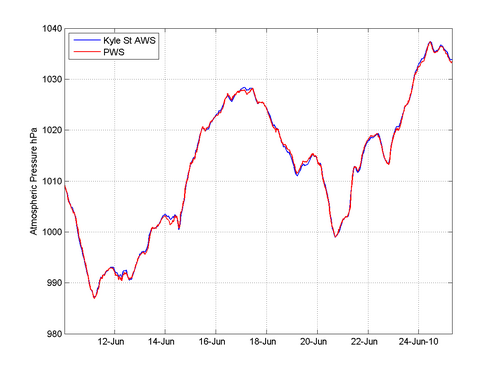Pressure Measurement
Atmospheric pressure (also known as barometric pressure) is the pressure exerted by the weight of the air above the Earth's surface. It is measured using a barometer. Atmospheric pressure and its rate of change are important parameters for weather and the ocean.
Units
The units used for pressure are hPa (hecto Pascals, although not a System International unit, this is used by meterorologists in much of the world) or mb (millibars, this is the equivalent used for public communications), but mmHg (millimetres of mercury, not used now), kPa (kiloPascals, used in Canada), inHg (inches of mercury, used in USA and by some UK instruments) are alternatives. Cumulus supports:
- 0 = mb (millibars)
- 1 = hPa (hectoPascals)
- 2 = in (inches of mercury)
Datum
Pressure decreases exponentially with altitude, so for consistency it is reduced to the common datum of mean sea level (MSL).
Setting the Datum
In Cumulus, the pressure datum is set by going to Configuration/Calibration and entering a number into the Pressure slot in Offsets.
The best way to get MSL pressure at your location is to go to a site like Weather Underground and enter your location. It will find a weather station nearby and give you the current MSL pressure. It's a good idea to choose an airport site because you can be sure that it has been accurately reduced to MSL pressure.
On the other hand, most airport sites only give pressure to the nearest hPa, so you can be 0.5 hPa out if you use that, whereas most personal weather stations give pressure with 0.1 hPa precision.
The best time to set your datum is when the pressure is steady; in other words when Trend shown at the bottom left in the Cumulus display is zero hPa/h.
To figure out what to put into the Cumulus box, use the following equation, where is the pressure on your console and is the pressure from a nearby station:
Locating the Barometer
For most personal weather stations, the barometer is in the console, usually attached to the printed circuit board. These barometers are very cheap devices that simply record the load on a diaphragm. Unlike the barometer in an automatic weather station, they have no temperature compensation. Therefore, for best pressure readings, you should locate the console in a place where the temperature is reasonably constant, not in direct sunlight or near a heater.
How Accurate are PWS Barometers?
The figure below shows a comparison between the pressure measured by a Fine Offset PWS and a nearby AWS. You can see that the comparison is excellent.



